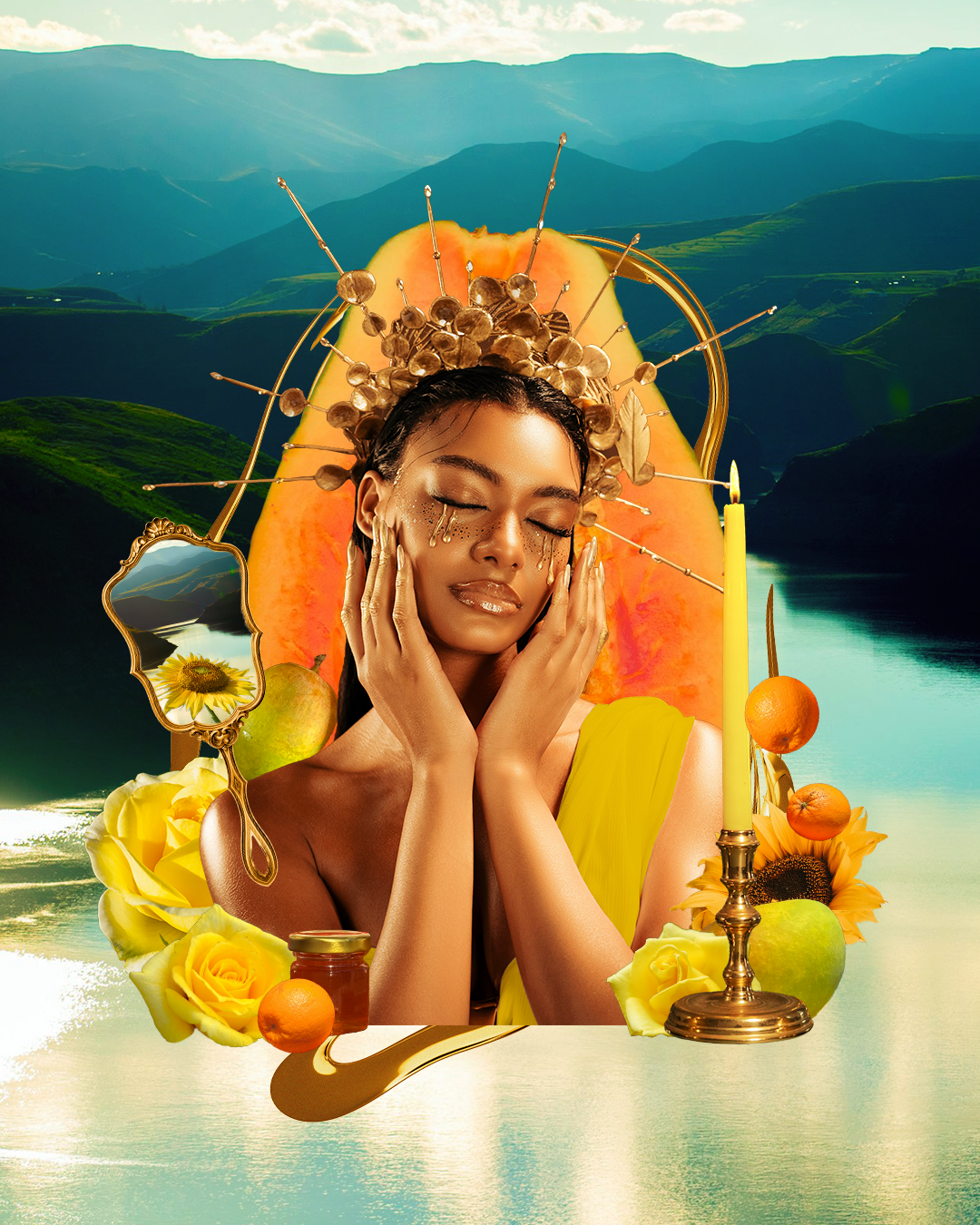[ad_1]

One Friday afternoon in February, Francisco Álvarez León loaded his white pickup with a basket of honey, a bottle of beer, and a bundle of yellow flowers. He turned on corridos, then drove along with his spouse and two younger youngsters to their favourite riverbank in Colima, México. That is the place Álvarez León practices Lucumí alongside two different monks, who’re referred to as babalawos within the faith; identified world wide as Santería, Lucumí shares its identify with the West African-descendant communities in Cuba who first developed the observe, which has since expanded throughout Latin America and its diaspora.
Upon their arrival, Álvarez León and his household sat by the water, unpacking the choices one after the other. He set all the pieces out in entrance of them, then stated a quiet prayer earlier than releasing the honey into the water and leaving the flowers on the riverbank.
The providing was for Ochún: the Lucumí orisha, or deity of recent water, luxurious, love, magnificence and candy issues. Álvarez León, who has studied and practiced Lucumí for practically 30 years, has turn out to be extra grounded in his objective and higher outfitted to navigate life’s inevitable chaos.
He first realized about Lucumí within the late ‘90s, after a compatriot requested him to affix a gathering close to his former residence in Las Vegas. “They began telling me about my future, how I used to be going to return into some cash — which I didn’t consider as a result of I didn’t know the place that a lot cash would come from,” he stated in Spanish.
Even so, he accompanied the group to a lake the following day, the place they carried out a ceremony for him. “I slept very well that night time and the following morning, an previous pal knocked on my door.” He was on the lookout for somebody to assist open two cellphone shops in Vegas — and Álvarez León ended up with $50,000 to assist make that occur.
His introduction to Lucumí might have been by the use of divination, however Álvarez León stayed within the observe as a result of it retains him grounded and linked — to his neighborhood, to the next consciousness, and to his ancestors. “Lucumí is spirituality, it’s a special way of life that inherently requires you to step away from unfavorable vitality,” he defined. “If I do one thing to taint that spirituality, I’ve to work exhausting and wait some time for that unhealthy vitality to go away my life and my vitality area.
“In order that’s made me notice that if I’m placing in a lot work to domesticate optimistic issues in my life, it’s not price doing something unfavorable. I’m very cautious who I’m round, the place I’m going, after I go locations and after I keep residence, and even considerate about what I say, as a result of that is what’s been serving to me,” he stated.
Álvarez León’s phrases resonate with up to date students, who’re actively working to destigmatize and demystify the faith. “Lucumí is all about survival and care,” defined Aisha M. Beliso-De Jesús, a professor of American research at Princeton College and writer of “Electrical Santería: Racial and Sexual Assemblages of Transnational Faith.”
“[Because these practices] had been for the survival of enslaved African peoples, [they] actually centered on individuals’s well being, well-being and stability… however nonetheless connecting again to African conventional non secular practices and beliefs,” added Beliso-De Jesús.
At its core, Lucumí is a practice that prompts us to ask: How will we stay in stability? And the way will we keep nicely in a world that usually needs us unwell?
And but, Lucumí is broadly misunderstood and steadily demonized — particularly inside white and white-adjacent Latine communities, lengthy entrenched with anti-Black beliefs. Though Catholicism, Evangelical Christianity, and even Jehovah’s Witnesses are broadly accepted in Latin households, Lucumí is simply too typically lowered to “witchcraft” or “voodoo,” just because it exists exterior the bounds of whiteness — and, extra importantly, in resistance to white supremacy.
Lucumí is an Afro-Caribbean faith with roots in Yoruba cosmology, fashioned and sustained by enslaved Africans in Cuba as an act of resistance and remembrance. Lucumí emphasizes character, stability and connection to the divine by means of orishas, “that are the energies which are tied to nature and the particular person’s personal stability on the earth,” defined Beliso-De Jesús.
The faith emerged out of necessity. When West Africans, primarily Yoruba individuals, had been enslaved and compelled to Cuba in the course of the transatlantic enslavement commerce, they carried their cosmologies with them. Although colonizers tried to erase their traditions by means of compelled conversion to Catholicism, enslaved Africans discovered methods to adapt and defend their religious practices. Over time, Yoruba non secular programs advanced into what we now name Lucumí or La Regla de Ocha, incorporating new layers of that means whereas retaining their ancestral spine.
Many of those early rituals occurred inside cabildos — Spanish-imposed non secular conferences meant to socialize enslaved individuals into Catholicism. “The church created these establishments to show enslaved Africans the right way to be ‘good Catholics,’” stated Elizabeth Pérez, an affiliate professor of faith at UC Santa Barbara and ethnographer and historian of Afro-Diasporic and Latin American religions. “However what really occurred is that individuals from totally different African teams bought collectively, remembered their songs and tales, and commenced reimagining their faith.” In different phrases: Colonizers unintentionally gave them an area to reconnect.
“Early practitioners started to open up the custom to individuals from different African ethnic teams,” defined Pérez. “They even initiated mixed-race people and folks of different backgrounds — Chinese language migrants, white Cubans — as a result of this was about survival. The purpose was to protect one thing, to create one thing highly effective and shared.”
Even after abolition, Lucumí continued — quietly, typically in non-public houses — as police and officers criminalized something perceived as “pagan.” To today, many practitioners preserve their religion discreet for security — and since outsiders nonetheless deal with it like one thing threatening or unusual. However the fact is: Lucumí has all the time been about safety, therapeutic and remembrance. Its roots lie not in worry, however in love and holistic well being.
Whereas animal sacrifice is an actual a part of some ceremonies, the media’s obsession with this specific observe has created a distorted image that reduces a complete religious system to a single, sensationalized act.
“The way in which individuals speak about sacrifice in Lucumí is usually utterly disconnected from the way it really works,” stated Akissi Britton, an assistant professor of Africana research at Rutgers. “Sure, animals are typically provided to the orishas. But it surely’s accomplished prayerfully, with care. The meat is nearly all the time ready and shared with the neighborhood.” In different phrases, it’s not some violent spectacle.
Beliso-De Jesús agreed, including that the fixation is racialized. “There’s a bent to view something African-derived as ‘barbaric,’ whereas turning a blind eye to widespread animal slaughter in different contexts,” she stated. “We kill tens of millions of animals every single day on this nation for meals, for science, for comfort.” However when Black individuals do it as a part of a sacred ritual, it’s instantly horrific?”
In 1993, the Supreme Courtroom dominated in Church of the Lukumi Babalu Aye v. Metropolis of Hialeah that legal guidelines banning animal sacrifice particularly focused Lucumí and violated practitioners’ First Modification rights. Nonetheless, even with the ruling in place, discrimination and surveillance proceed — holdovers from centuries of colonial rule.
“Vilification was strategic,” stated Beliso-De Jesús. “Colonizers wanted a solution to justify enslavement, genocide and compelled conversion. So that they painted African and Indigenous religions as evil.” That wasn’t a mistake — that was a part of the plan.
Britton put it much more plainly: “Something that wasn’t Christian bought demonized. And as soon as one thing is seen as demonic, it’s simpler to police. It’s simpler to ban. It’s simpler to worry.”
One other persistent stereotype is that Lucumí is all about “black magic” or throwing curses at your enemies. That is harmful nonsense rooted in worry of African spirituality, stated Britton.
“Lucumí is about aligning your self along with your future,” she stated. It’s about nourishing your spirit, taking good care of your physique, honoring your ancestors, and staying in stability. Throwing negativity at somebody nearly assures it’ll come again to you, and you then’ll be off stability.
Beliso-De Jesús expanded on that concept, pointing to the idea of iwa pele, or good character, as a guideline in Lucumí. “It’s about dwelling nicely, not harming others, and being in the precise relationship with your self and your neighborhood,” she stated. In different phrases, Lucumí and the orishas aren’t devices of revenge — they’re sacred forces that information individuals towards readability and stability.
The reality is that Lucumí honors nature, uplifts ancestors, and gives instruments for collective survival. That’s precisely what made it so threatening to those that uphold white supremacy — and precisely what makes it lovely as we speak.
[ad_2]

